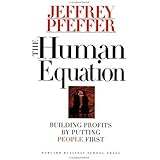
Average Reviews:

(More customer reviews)The premise of Pfeffer's book is that companies' success is directly correlated to the quality of people and their management. This seems like common sense. After all, many companies proclaim "people are our biggest asset." In practice, however, it's uncommon sense: companies often lack the deep conviction necessary to follow through. It's much easier to take a "tough love" approach to "management," cut training and lay off 10% of the workforce than it is to focus on the long-term people issue.
Based on his research, Pfeffer offers several HR practices that are common in effective organizations. Among them:
* Maintain a sense of employment security. Psychologically speaking, people will work more effectively when they can focus on doing their job rather than worrying about keeping it. Similarly, if employees are your company's hugest asset, then it behooves you to ensure they're not working for your competition. This is common sense.More companies practice uncommon sense and get sucked into the peformance death-spiral. For example, we frequently read where a new CEO is brought in and his first action is to initiate layoffs. (Apple Computer is an often-cited case study of this.)With their sense of security threatened, the remaining employees will become less motivated. Profits begin to sag, so the company reacts by cutting training. Employees may have more accidents, and customer service is affected. The spiral continues until it or the company broken.
* Hire selectively - a recurring theme is that to avoid layoffs, you need to be operating efficiently enough not to *have* extra employees.
In a perfect world, we would have a large number of applicants, screen them based on corporate fit and their attitude, then filter them out through several rounds of screening. Senior staff should become involved in the latter part of the process to emphasize the importance of hiring.After hiring, we need to evaluate the success of our hiring practices and adjust them as necessary. This follows the axiom "that which gets measured, gets done." This common sense approach is used by highly successful companies such as Southwest Airlines and Cisco.Companies exhibiting "uncommon sense" may get so desperate to fill the position that they go against their own guidelines. Having made this mistake before, I am very much aware that a bad hire is far worse thanno hire.
* Facilitate ownership and responsibility through decentralized decision making.
Assuming you hire the "best and brightest," you should trust them to use their brains. This provides a sense of ownership, challenge, andsupports the organization's organic development. We all hope to have the equivalent of the "Post-It" note developed internally by folks taking initiative.
Pfeffer had an interesting comment from Bill Gurley about the effectiveness of stock options. Specifically, they're not really as much a sense of ownership as we'd like to believe because if the market has a violentdownswing (as it did in early 2000), employees are almost incented to leave their underwater options.
-
Pfeffer's book is an evolution of his previous ideas. What's also interesting in his analysis was seeing that long-term company success was *not* correlated to technology or industry.
Pfeffer's suggestions seem like common sense, but Pfeffer realizes they're not AND is aware of the need to quantify the information. The case studies and quantitative research are very helpful in supporting these ideas. In a few of the cases -- Lincoln Electric springs to mind -- it would be especially helpful to have a more recent examination, perhaps a follow-up.
Click Here to see more reviews about: The Human Equation: Building Profits by Putting People First
Click here for more information about The Human Equation: Building Profits by Putting People First

0 comments:
Post a Comment